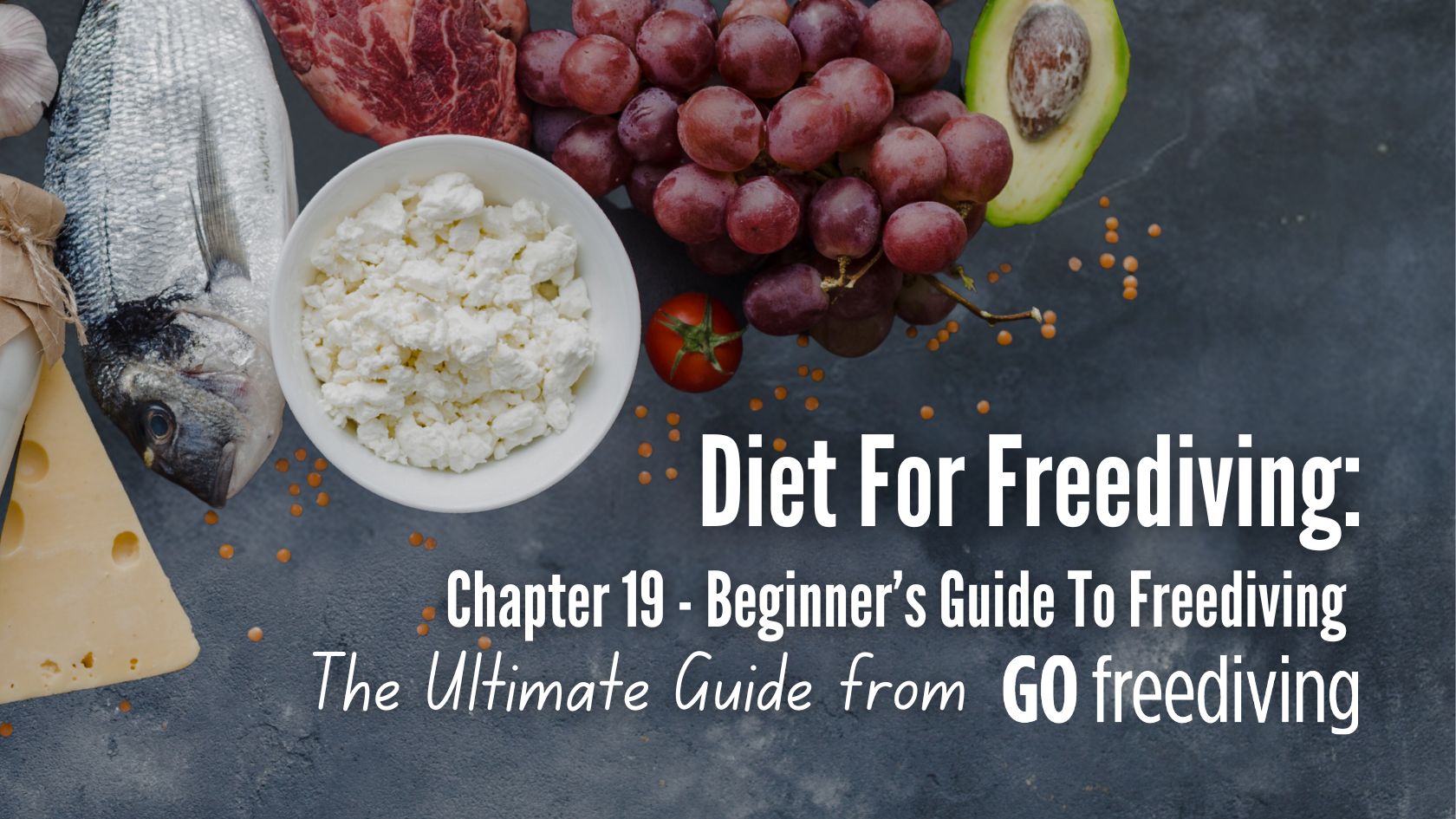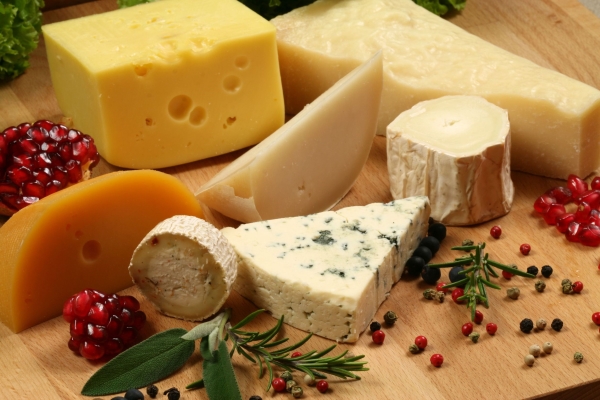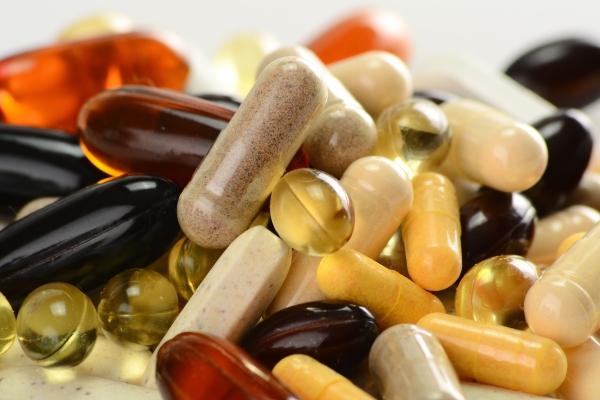Welcome to Part Nineteen of The Beginner’s Guide to Freediving, the best place to start your freediving journey. If you’re planning to start freediving, this chapter is all about my favourite subject: food! It looks at the best type of diet for freediving – what foods help and what foods hinder, as well as supplements that can help you hold your breath for longer and recover quicker.
The Optimum Diet For Freediving
The food and drink that you put in your mouth can have a massive effect on your freediving. It can impact your ability to equalise, your breath hold, and how quickly you recover from a freediving session. Even though there are general diet rules that apply to most people, we are all individuals and even a food that promotes good health in most people may adversely affect you. So, as with all aspects of freediving, listen to your body, research your own health conditions and take advice from your doctor where applicable.
In this article we will look at diet for freediving, i.e. food and drink that can cause problems in freedivers, how to ensure efficient digestion, supplements that may be of help, and the foods that will generally help promote health and successful freediving and recovery.
We will look firstly at food groups that cause inflammation in the body, lead to excess mucous production, cause gastrointestinal discomfort, impair digestion, increase dehydration and increase the heart rate.
Diet For Freediving – Mucous Forming Foods
Mucous has many functions in the body, including protecting our organs from pollutants such as cigarette smoke, dust and pollen; and acting as a defense mechanism by trapping viruses and bacteria. Excess mucous in the body, though, can cause problems with your freediving. In your sinuses it can massively hinder your ability to equalize effectively and consistently, and cause chronic sinusitis and postnasal drip. Excess mucous in the lungs can cause the chest to become tight and restrict your breathing. Some foods and drinks causes excessive mucous production due to an allergic reaction and can exacerbate conditions such as asthma, colds, COPD and cystic fibrosis. Some people are affected by mucous forming foods more than others.
These are the most common mucous forming foods:
- Dairy products – These foods lead to the greatest mucous production in your body and they can be highly allergenic as well, which can lead to intestinal problems. If you wish to see how dairy affects your body then try removing it from your diet for at 30 days and see how your body reacts when you reintroduce it.
- Gluten – Second only to dairy in its ability to produce mucous in the body are foods containing gluten. Gluten is an indigestible glue-like substance that holds molecules together in things like bread, giving it its texture. Gluten is found in wheat, barley, rye and oats, though the latter is as a result of cross-contamination due to being grown in the same fields used for wheat and processed using the same machinery. Gluten is often added to soups, sauces and even injected into many meat products. It can be hard to avoid unless you research carefully and know what to look for on the back of a food packet. As with dairy, try removing it from your diet for at least 30 days and see how your body reacts when when you reintroduce it.
- Sugar – The sweet stuff including sucrose, fructose found in fruit, honey, maple syrup, high fructose corn syrup, agave syrup, sucralose and sweeteners.
- Refined flours and flour products
- High-fat red meat and processed meats – This can be alleviated somewhat by eating grass-fed meat, which is leaner, and the use of digestive enzymes or eating it with foods that help digestion.
- Alcohol
- Caffeine – Especially in drinks that also contain large amounts of sugar.
- Some fruits and vegetables – Particularly bananas, white potatoes, corn, and cabbage. Lacto-fermenting the cabbage (such as traditional sauerkraut) has been reported to lead to lower mucous production.
- Allergenic foods – Some foods are common allergens and if you are susceptible to their effects then your body will increase mucous production. These include soy, wheat, artificial additives, preservatives and eggs.
Sometimes it can be hard to pin down what foods are producing mucous in your body, and it ca be equally difficult to completely avoid eating them. There are some foods that can relieve the production of mucous, helping to alleviate symptoms:
- Vegetables – Including ginger, horseradish, garlic, onions, celery, parsley, winter squash, greens, brussel sprouts and peppers.
- Fruits – Such as berries and lemons.
- Chicken soup – Made with traditional stock.
- Oily fish – Including salmon, tuna, mackerel, herring and sardines.
- Olive oil
- Herbs – Use essential oils such as eucalyptus, thyme, peppermint and pine in a steam inhalation.
Diet For Freediving – Foods That Cause Inflammation in the Body
Some inflammation is helpful, as it is your body’s way of protecting itself by removing damaged cells, irritants or pathogens, and promoting the healing process. Chronic inflammation on the other hand, whereby the immune response is not shut off, is incredibly dangerous and has been linked to cancer, heart disease, arthritis, diabetes, Alzheimer’s, autoimmune conditions and many other diseases. Inflammation in the body will affect a freediver’s ability to equalize their ears and sinuses, as well as potentially causing gastrointestinal problems.
Foods that cause inflammation:
- Gluten – A protein found in wheat, rye, barley and some oat products that promotes inflammation.
- Casein – A protein found in dairy and whey products.
- Refined carbohydrates – White flour products such as bread, pasta and noodles, white rice, white potatoes and many cereals are refined carbohydrates and may trump fats as the main cause of obesity and other chronic conditions.
- Sugar – Processed sugars trigger the release of inflammatory messengers called cytokines. Sugar goes by many names so look out for any word ending in “ose,” (e.g. fructose or sucrose) on ingredient labels.
- Aspartame – Aspartame is an artificial sweetener found in more than 4,000 products worldwide. It is a neurotoxin and if you are sensitive to this chemical, your immune system will react by attacking it, triggering an inflammatory response.
- Omega 6 fatty acids – We need Omega 6 for normal growth and development, however the ratio of Omega 6 to 3 should be 1:1. This has been skewed in western diets so that many people are consuming a ratio of up to 25:1. Excess consumption of Omega 6 can trigger the body to produce pro-inflammatory chemicals. These fatty acids are found in oils such corn, safflower, sunflower, grape-seed, soy, peanut, and vegetable oils.
- Trans fats – These trigger systemic inflammation and can be found in fast foods and other fried products, processed snack foods, frozen breakfast products, biscuits, donuts, crackers and some margarine. Avoid foods with partially hydrogenated oils in the ingredient labels.
- Saturated fat – Studies have shown that saturated fats trigger adipose, or fat tissue inflammation, however these studies also mixed saturated fat with refined carbohydrates so it is being debated whether it was the saturated fat or the refined carbohydrates that caused the problems.
- Commercially produced meat – Animals traditionally meant to eat grass that are instead fed grains such as soya and corn (high in inflammatory Omega 6 fatty acids) and raised in a restricted environment produce meat higher in saturated fat and higher in Omega 6. Grass fed, free range animals fed on their natural diet produce leaner meat with less Omega 6 and more Omega 3.
- Processed meat – These include animal products that have been smoked, cured, salted or chemically preserved.
- MSG – Monosodium glutamate (MSG) is a flavor-enhancing food additive most commonly found in prepared Asian food and soy sauce, but it can also be added to fast foods, pre-prepared foods, dressings and meat products. This chemical can trigger two important pathways of chronic inflammation.
- Alcohol – This is a burden to the liver and can cause inflammation. It is best eliminated or used in moderation.
A diet rich in vegetables, olive and coconut oil, seafood, eggs, small amounts of fruit, nuts and seeds, and grass-fed meat will usually help reduce inflammation in the body. Turmeric has been shown to be very useful in reducing inflammation but it needs to be taken with black pepper.
Diet For Freediving – Digestion
When planning your diet for freediving you should remember that if you freedive too soon after eating or drinking, or eat foods that cause you gastrointestinal distress, then your freediving will be affected. When you freedive, the digestion process slows or stops, leaving food to ferment in your stomach, which can cause pain, indigestion and reflux.
Everyone’s body digests food differently so it is important to work out your own personal diet for freediving (when you can eat and what you can eat before a dive). The more you eat, the longer you will need to leave before a dive. Different foods also spend different amounts of time in the stomach before moving to the small intestine. Fruit spends the shortest time in the stomach and is always best eaten on an empty stomach. If you eat a meal with protein, carbohydrates and fat then you will need to wait at least an hour before diving, and many people will need to leave far longer. If you struggle with digestion then you may find that taking digestive enzymes with a meal helps, or drinking cider vinegar or lemon juice before a meal to stimulate the digestive process.
Many people find that certain foods cause bloating and gas which affects their freediving. If you suffer from this it may be worth looking into FODMAP foods. This stands for Fermentable Oligosaccharides, Disaccharides, Monosaccharides And Polyols. They are short-chain carbohydrates which are incompletely absorbed in the gastrointestinal tract and can be easily fermented by gut bacteria. These sugars also exert an osmotic effect, increasing fluid movement into the large bowel. The fermentation and osmosis caused by these undigested sugars are a cause of major IBS symptoms such as gas, pain, and diarrhea.
Some high FODMAP foods:
- Fructose – Found in fruits, honey, high fructose corn syrup
- Lactose – Found in dairy
- Fructans – Found in wheat, garlic, onion, inulin
- Galactans – Found in legumes such as beans, lentils, soybeans, cashews, pistachios
- Polyols – Found in sweeteners containing isomalt, mannitol, sorbitol, xylitol
- Stone fruits – Such as avocado, apricots, cherries, nectarines, peaches, plums, dates
- Fruits – Such as apples, mango, pears, watermelon, dried fruit
- Vegetables – Including artichokes, cabbage, cauliflower, mushrooms, sugar snap peas
Some people are more susceptible to certain FODMAP foods than others. Some issues with legumes, such as beans and lentils, can be minimized by soaking them and then sprouting them before eating or cooking.
Diet For Freediving – Foods That Raise the Heart Rate
Freedivers want to keep their heart rate low and their body relaxed. Unfortunately there are many foods and drinks that elevate the heart rate, such as foods and drinks high in sugar and caffeine and should be reduced or avoided when planning your diet for freediving.
Most people eat on a daily basis far more sugar than is advised by health experts. Sugar is hidden in many foods we eat, from breakfast cereals to savory meals. Even if people make a concerted effort to avoid sugar, they often increase their consumption of fruit, fruit juice and dried fruit, all of which are high in sugar. A 500ml serving of orange juice contains 51 g of sugar and because this is not buffered by the fiber consumed when eating an orange fruit, it is absorbed faster, causing an insulin spike overloading the liver, where it’s converted into fat.
Caffeine also raises the heart rate and acts as a diuretic, dehydrating the body. It is not advised to cut your caffeine habit the day before you dive, though, as the withdrawal symptoms will most likely give you a splitting headache that can ruin your whole session!
Another drink that causes dehydration is alcohol and the impacts can easily be felt the day after drinking. This is why it is not recommended to drink the night before you dive.
Keeping hydrated is very important for freediving as it is easy to become dehydrated through immersion diuresis, sweating and breathing in and out through the mouth. Dehydration can leads to impaired performance, headaches, cramp, decreased cognitive and muscle functioning, fatigue and DCS.
As part of your diet for freediving, it is recommended to drink before and a after a dive session, and small amounts frequently during the dive session. Sports drinks can be useful to re-hydrate the body, however it is cheaper and better to make your own.
Diet For Freediving – Supplements
Why should anyone need to take supplements? Today, despite having plenty of calories, many people are undernourished. A lack of nutrient dense food; fruit and vegetables often picked under-ripe and only reaching your plate months after they have been picked; over-farmed, denatured soils; over-cooked vegetables; and stress leading to compromised immunity are just some of the factors that contribute to this. Many people also have health conditions that reduce the amount of certain nutrients in their food reaching the parts of the body where they are needed. Children need more nutrients to support growth, older people need more nutrients due to mal-absorption, and some foods deplete nutrient stores and inhibit nutrient absorption.
When assessing what supplements you may need (irrespective of freediving) it is important to take into consideration all the above factors and more to find a tailor made program that works for you.
A diet for freediving brings with it a new set of considerations regarding food and supplements. When we freedive, our cells break down sugars for energy, which is known an anaerobic respiration. This produces free radicals in your body, which have been linked to aging, cancer, diabetes, heart disease and dementia. You may find that after a long freediving session you feel much more tired than if you had done another form of exercise and that you need to sleep for longer to recover.
Free radicals can be combated by increasing the amount of antioxidants in our diet. Antioxidants are chemicals that can prevent or slow down cell damage and are found mainly in vegetables and fruit, sea vegetables and some seafood. The most common compounds are vitamins A, C, E, beta-carotene and lycopene. A diet rich in vegetables and fruit, eaten raw (mainly for fruit) and lightly steamed (for most vegetables, particularly green vegetables such as kale) will provide you with lots of antioxidants. Many freedivers will still find benefit from supplementing their diet with antioxidant supplements.
Iron is an essential mineral used to transport oxygen around the body. A deficiency in iron causes anemia, which is expressed by fatigue and weakness. Iron is better absorbed from ‘heme’ sources found in meat and should always be eating in conjunction with foods containing vitamin C, which helps the absorption of the iron. High iron foods include liver, clams/mussels, oysters, beef, canned sardines, poultry, fish, lamb pork, veal, sunflower seeds, nuts, beans, dark leafy greens (spinach), and dark chocolate.
Potassium is a tissue salt that is lost during exercise. Many people eat bananas as a way of replacing potassium, however they can be mucous-forming in some people. Foods higher in potassium than bananas include avocados, which have almost twice as much potassium by volume than bananas, as well as sweet potatoes, leafy greens, beans, winter squash and dates.
Concentrated beetroot juice is an exciting supplement for freedivers that has been linked to improving breath hold times. It contains high levels of nitrate which, once broken down in the body to nitric oxide, helps our muscles perform at the same level whilst using less oxygen. Researchers found that participants held their breath for 11% longer if they were given a 70ml shot of concentrated beetroot juice before diving.
Probiotics can be found in supplement or food form and improve digestive health, oral health, skin conditions, your immune system, reduce allergies and have even been linked to reducing obesity. Good sources include lacto-fermented vegetables (such as sauerkraut and kimchi), kefir, miso, kombucha, tempeh and plain yoghurt.
Diet for freediving – In Summary
Before making any big changes to your diet for freediving purposes, we recommended keeping and food and drink diary for at least two weeks, so you have a clearer idea of exactly what you are fueling your body with. Then talk to your doctor or medical practitioner about your medical conditions and anything else that may affect your diet. Spend some time researching diets and supplements so that you feel fully informed and confident that you are making the right decisions for you.
It is important also to record in your freediving log book what you have eaten before and after a dive and how it affected your session and recovery.
A good diet for freediving should include foods that are easily digestible, nutrient dense foods. Think about your plate being filled with different colored vegetables (eat the rainbow), and eat fruit, lacto-fermented foods, oily fish, high quality protein and good fats. Food should be nutritious, delicious and should be what works best for your body and your freediving.
Written by Emma Farrell
The Beginner’s Guide to Freediving is written by Emma Farrell. She is one of the world’s leading freediving instructors and has been teaching freediving since 2003. She is the author of the book ‘One Breath, a Reflection on Freediving’, has written courses that are taught worldwide, taught gold medal winning Olympic and Paralympic athletes, and has appeared numerous times on television teaching everyone from Hugh Fearnley-Whittingstall to Ellie Simmonds how to freedive.
Learn to freedive with the author of The Beginner’s Guide to Freediving
Go Freediving is the longest established, most experienced and friendliest freediving course provider in the UK, led by world class freediving instructor trainer Emma Farrell, and her team of personally trained instructors. No other course provider has such a good instructor to student ratio, safety record and personal touch.
Whether you’re a beginner dipping your toes into the world of freediving, a seasoned pro looking to turn professional, or simply a freediver of any level who wants the best freediving holiday in the world, we’re here for you!
Learn more about Freediving
Read the previous chapter of The Beginner’s Guide to Freediving – ‘Using a Monofin for Freediving’ here now
Coming soon: the final chapter of The Beginner’s Guide to Freediving – ‘How to Turn Professional in Freediving’









Leave A Comment